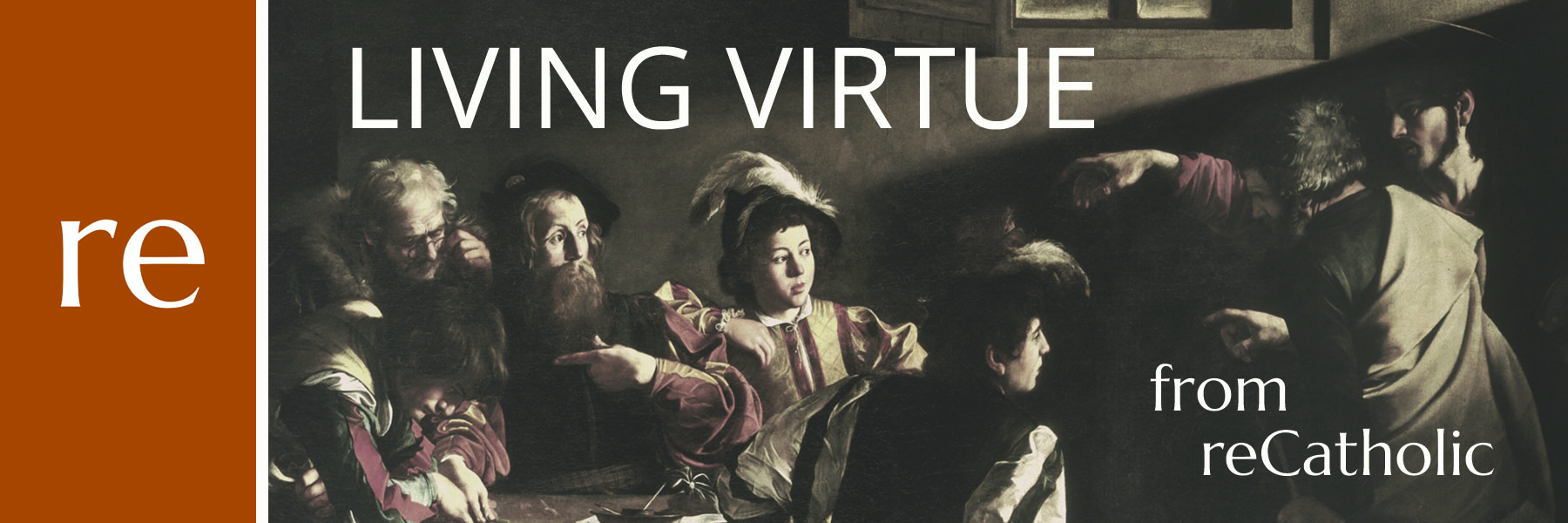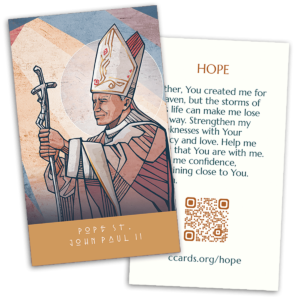
Virtue – Hope
Hope is our firm conviction that God created us for eternal happiness, our absolute desire to make it to heaven, and our trust that God will help us on our journey.
1. Understand Hope
What is Hope?
Another word for hope is “trust.” Unlike other human virtues that we can develop, hope is a gift we receive at our baptism. Instead of forming it like other good habits, it grows stronger as our relationship with God grows stronger.
When we trust in God and His promises of eternal life, we start to see that everything has a purpose, because it is permitted within God’s plans for our everlasting happiness.
The more we learn to trust God, the easier it is to practice the rest of the virtues. We begin to desire more than the passing things of this world and learn to value spiritual things that really matter.
From the Catechism
CCC 1817: Hope is the theological virtue by which we desire the kingdom of heaven and eternal life as our happiness, placing our trust in Christ’s promises and relying not on our own strength, but on the help of the grace of the Holy Spirit. “Let us hold fast the confession of our hope without wavering, for he who promised is faithful.”84 “The Holy Spirit . . . he poured out upon us richly through Jesus Christ our Savior, so that we might be justified by his grace and become heirs in hope of eternal life.”85
The Virtue Lived – Pope St. John Paul II
 Born in Poland in 1920, by the young age of 20, Karol Wojtyła had already lost his entire family. Before being ordained to the priesthood in 1946, he first lived through the tragedies of World War II, experiencing the darkness of both the Nazi and Communist regimes in Poland.
Born in Poland in 1920, by the young age of 20, Karol Wojtyła had already lost his entire family. Before being ordained to the priesthood in 1946, he first lived through the tragedies of World War II, experiencing the darkness of both the Nazi and Communist regimes in Poland.
Wojtyła was consecrated a bishop in 1958, and served in Krakow as auxiliary and later as Archbishop under communist rule until he was elected Pope John Paull II in 1978.
As the Roman Pontiff, he renewed the Church’s vision of sexuality through his teachings on the “Theology of the Body.” He was instrumental in the peaceful fall of Communism. He participated in reforming the Liturgy, the Catechism and the Code of Canon Law through the Second Vatican Council, and led the church to renewed relationships with Jewish, Christian and Eastern Religions.
Pope Saint John Paul II founded and led the first 9 “World Youth Days,” often gathering millions of people in the name of God. He traveled to 129 countries as a witness to hope for the entire world. He survived an assassination attempt, and, up until his last breath, led the Church with his example of hope in God. He often challenged young people to “be not afraid” to open the doors of their hearts to Christ.
2. Virtue In My Life
Spiritual Questionnaire
Questions geared towards self knowledge and personal growth
Struggles
- When dealing with other people, do I spontaneously trust and share, or am I more cautious and careful about letting people in? When it comes to God, am I the same way?
- Are there areas in my life where I fear letting God in? Are there things that I am perhaps afraid to talk to God about?
- Am I sometimes hesitant to approach God through the confessional, because I feel that my sins are too much? Or that the priest won’t understand?
- Are there good projects that I have not started, or responsibilities that I have not taken on, because I consider myself too weak? Have I brought these fears to God? Am I willing to ask for help from others?
Highlights
- How often do I think about heaven? Do I imagine what it will be like? Do I look forward to reconnecting with family and friends who have passed away?
- Are there qualities about myself that I realize are God’s free gifts? Have I reflected on these, and come to realize that I should trust Him more often?
- Do I often think about Jesus’ sacrifice on the cross? Do I realize that He loves me more than anyone else; to the point that He was willing to die for me?
- Are there any Saints who I feel especially close to? Do I ask for their intercession to help me trust God the same way that they did?
Prayer
- When I receive communion, do I thank Jesus for His love for me? Do I ask Him to help me to trust Him more and more?
- When I am faced with a difficult situation, have I learned to confidently bring my struggles to Jesus in prayer, to find clarity, strength and guidance?
- Do I trust that all my thoughts, words and actions have eternal value in God’s eyes? Do I offer little acts of kindness, generosity or patience as concrete ways to trust in God’s plan for my happiness?
3. Growing In Virtue
A Prayer for Virtue
Father, You created me for heaven, but the storms of this life can make me lose my way. Help me trust that You are with me and strengthen my weaknesses with Your mercy and love. Give me confidence, remaining close to You. Amen.
Pope Saint John Paul II // Pray for us
Practical Tips for Living This Virtue
- List all the ways that God has proven to you that He is trustworthy. Talk to God about those reasons, thank Him for His gifts, and ask for a constant increase in trust.
- Gratitude is a great way to build trust, because it helps us remember highlights from the past. When you struggle to trust God, list the things you are grateful for.
- In moments when you are at peace, it can be helpful to rethink the trials you have been through in the past, and to recognize all the lessons learned and the way God has blessed you through them. This will strengthen your relationship of trust for the future.
- To grow in trust, imagine what your heaven will be like. What are your greatest desires? How will those be fulfilled? Focus on your desire to be truly happy; ask yourself where those desires come from.
4. Other Resources
The Catechism
CCC 1818: The virtue of hope responds to the aspiration to happiness which God has placed in the heart of every man; it takes up the hopes that inspire men’s activities and purifies them so as to order them to the Kingdom of heaven; it keeps man from discouragement; it sustains him during times of abandonment; it opens up his heart in expectation of eternal beatitude. Buoyed up by hope, he is preserved from selfishness and led to the happiness that flows from charity.
CCC 1819: Christian hope takes up and fulfills the hope of the chosen people which has its origin and model in the hope of Abraham, who was blessed abundantly by the promises of God fulfilled in Isaac, and who was purified by the test of the sacrifice.86 “Hoping against hope, he believed, and thus became the father of many nations.”87
CCC 1820: Christian hope unfolds from the beginning of Jesus’ preaching in the proclamation of the beatitudes. the beatitudes raise our hope toward heaven as the new Promised Land; they trace the path that leads through the trials that await the disciples of Jesus. But through the merits of Jesus Christ and of his Passion, God keeps us in the “hope that does not disappoint.”88 Hope is the “sure and steadfast anchor of the soul . . . that enters . . . where Jesus has gone as a forerunner on our behalf.”89 Hope is also a weapon that protects us in the struggle of salvation: “Let us . . . put on the breastplate of faith and charity, and for a helmet the hope of salvation.”90 It affords us joy even under trial: “Rejoice in your hope, be patient in tribulation.”91 Hope is expressed and nourished in prayer, especially in the Our Father, the summary of everything that hope leads us to desire.
CCC 1821: We can therefore hope in the glory of heaven promised by God to those who love him and do his will. 92 In every circumstance, each one of us should hope, with the grace of God, to persevere “to the end” 93 and to obtain the joy of heaven, as God’s eternal reward for the good works accomplished with the grace of Christ. In hope, the Church prays for “all men to be saved.” 94 She longs to be united with Christ, her Bridegroom, in the glory of heaven: Hope, O my soul, hope. You know neither the day nor the hour. Watch carefully, for everything passes quickly, even though your impatience makes doubtful what is certain, and turns a very short time into a long one. Dream that the more you struggle, the more you prove the love that you bear your God, and the more you will rejoice one day with your Beloved, in a happiness and rapture that can never end. 95
Hope always draws the soul from the beauty that is seen to what is beyond, always kindles the desire for the hidden through what is perceived. – Gregory of Nyssa
The most hopeful people in the world are the young and the drunk: the first because they have little experience of failure, and the second because they have succeeded in drowning theirs. – Thomas Aquinas
Hide yourself in Jesus crucified, and hope for nothing except that all men be thoroughly converted to His will. – Paul of the Cross
I am afraid that if we begin to put our trust in human help, some of our Divine help will fail us. – Teresa of Avila
We shall steer safely through every storm, as long as our heart is right, our intention fervent, our courage steadfast, and our trust fixed in God. – Francis de Sales
With the confidence of a son, rest in the care and love that divine Providence has for you in all your needs. Look upon Providence as a child does its mother who loves him tenderly. You can be sure that God loves you incomparably more. – Jane Frances de Chantal
He who trusts in himself is lost. He who trusts in God can do all things. – Alphonsus Liguori
Books
On Hope – Pope Francis
The Promise – Jonathan Morris
The Way of Trust and Love – Jacques Philippe
Videos
What Is Hope and Why Do You Need It? – Fr. Mike Schmitz
Hope – Fr. Gregory Pine, O.P.
Videos en Español
La Esperanza Virtud Teologal – Pbro. Jesús Rojas Rojo
Footnotes
84 Heb 10:23.
85 Titus 3:6-7.
86 Cf. Gen 17:4-8; 22:1-18.
87 Rom 4:18.
88 Rom 5:5.
89 Heb 6:19-20.
90 1 Thess 5:8.
91 Rom 12:12.
92 Cf. Rom 8:28-30; Mt 7:21.
93 Mt 10:22; cf. Council of Trent DS 1541.
94 1 Tim 2:4.
95 St. Teresa of Avila, Excl. 15:3.